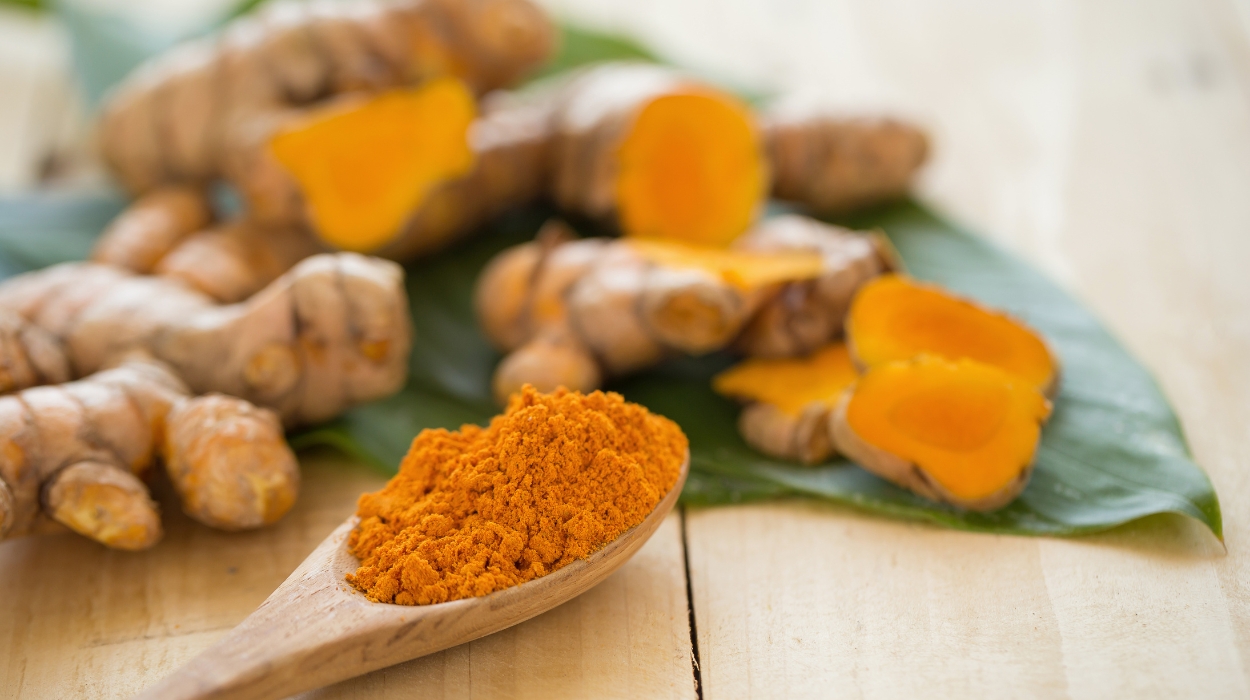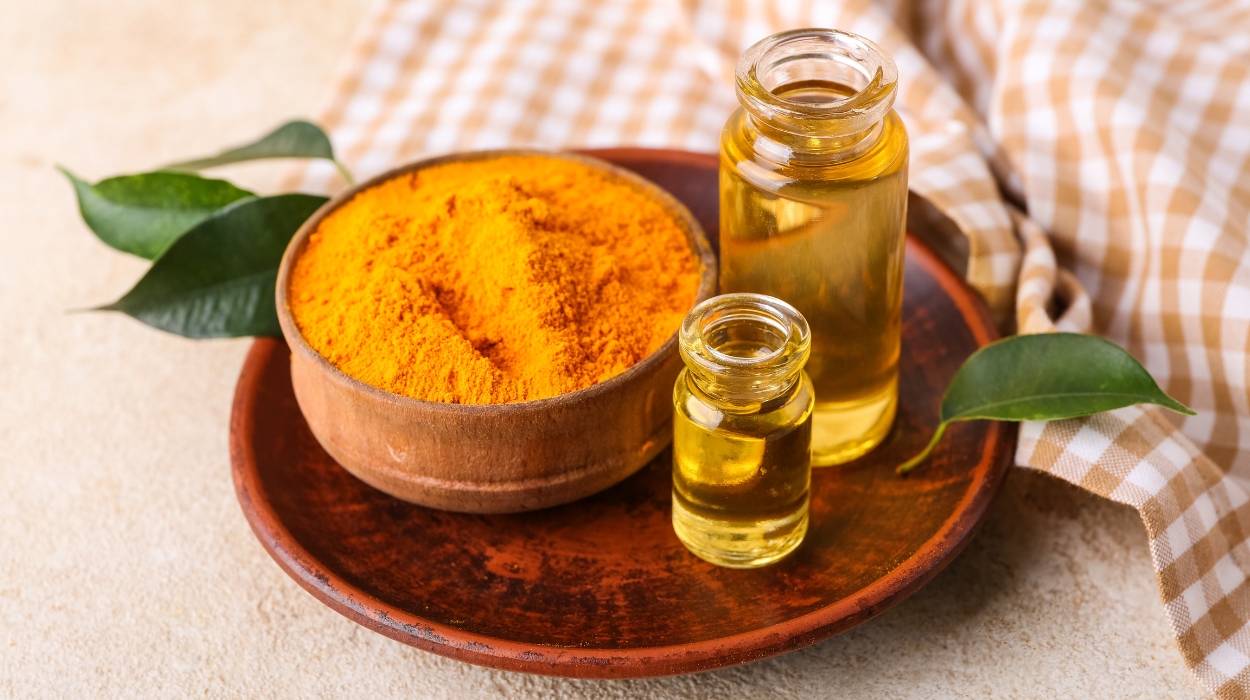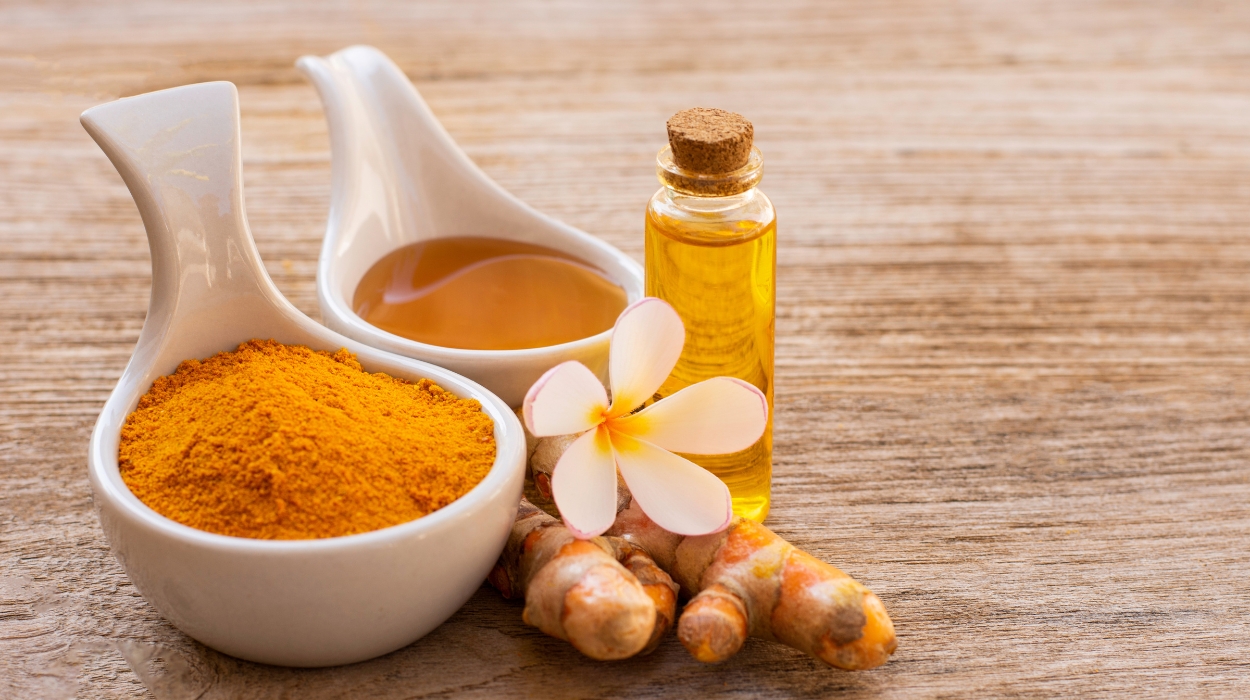 Expert's opinion
Expert's opinion
Expert's opinion
The article is a subjective view on this topic written by writers specializing in medical writing.
It may reflect on a personal journey surrounding struggles with an illness or medical condition, involve product comparisons, diet considerations, or other health-related opinions.
Although the view is entirely that of the writer, it is based on academic experiences and scientific research they have conducted; it is fact-checked by a team of degreed medical experts, and validated by sources attached to the article.
The numbers in parenthesis (1,2,3) will take you to clickable links to related scientific papers.
Turmeric For Hair Growth: Benefits & Ways To Use 2024

Are you looking for a natural and effective way to stimulate hair growth? You may try hair masks and the best deep-condition hair products. Some people use turmeric for hair growth.
Turmeric[1] is a golden root spice, part of the ginger family, renowned for its numerous health benefits. It adds flavor to your culinary delights, but does turmeric stop hair growth or boost it? This article will explore the truth about turmeric and hair growth. We’ll also offer practical ways to incorporate it into your hair care routine.
So, let’s delve into the world of turmeric and unlock its secrets for beautiful and thriving hair.
Tumeric For Hair: Does It Work?
Yes, turmeric is incredibly beneficial for the hair. Turmeric plant is rich in curcumin, its active compound. Curcumin stimulates hair loss, nourishes the scalp, and treats dandruff. Turmeric’s antioxidant and anti-inflammatory properties help combat hair loss, improve scalp health, and treat dandruff. Try turmeric hair masks, supplements, or turmeric-infused products.
Turmeric Benefits For Hair

This bright orange spice has impressive effects in the foods and spices world, but how is it helpful for hair? Here are the benefits of turmeric you can expect when using it for hair growth:
Promotes Hair Growth
Turmeric can stimulate blood circulation[2] through its active-rich compound, curcumin. Curcumin may nourish hair follicles and encourage new hair growth. This may promote better scalp health, fostering hair strand growth[3] in thickness, length, strength, and density.
Promotes Healthy Hair Follicles
Dry hair follicles are tough to keep; they itch, fall, and tangle. In contrast, healthy hair follicles produce clean, healthy, and strong hair. Turmeric helps keep your hair follicles healthy by soothing inflammation and protecting against sun or chemical damage.
Turmeric’s anti-inflammatory properties[4] can soothe the scalp and prevent conditions like folliculitis[5] – inflammation of the hair follicle – which can lead to thinning hair.
Fights Hair Loss
Hair loss, or alopecia,[6] is a common concern with several potential causes. Turmeric might help treat hair loss due to its anti-inflammatory and antioxidant properties. These properties may reduce scalp inflammation often associated with male or female pattern hair loss.[7]
A topical preparation of curcumin and other plant-based antioxidants, piperine, and capsaicin, significantly promotes hair growth for certain hair loss conditions.[8]
Nourishes And Protects Hair And Scalp
A healthy scalp is essential for optimal hair growth and overall hair wellness. The natural antiseptic properties[9] of turmeric can soothe and calm the scalp, potentially relieving itching and irritation. It also helps balance oil production,[10] benefiting those with oily hair. Turmeric also offers wound healing[11] benefits for any scalp injuries.
Turmeric-based scalp treatments – especially those with nourishing oils like olive oil – can help keep your scalp healthy. This offers your hair and scalp an ideal environment for hair growth.
How To Use Turmeric For Hair Growth?

Turmeric Hair Mask
If you are experiencing thinning hair, create a nourishing hair mask by combining turmeric powder with yogurt, olive oil, and honey.[12] Apply the hair growth turmeric mask to your scalp and hair, leaving it on for 20-30 minutes before rinsing. This turmeric mask can promote healthy hair growth, soothe the scalp, treat dandruff,[13] and combat hair loss.
Turmeric-Infused Oil
Heat the oil to infuse olive oil with turmeric, then add turmeric powder. Allow the mixture to cool, and strain out the turmeric particles. Massage the oil into your scalp and leave it on overnight for deep hair and scalp nourishment.
Turmeric And Coconut Milk Hair Rinse
Blend turmeric powder with coconut milk to create a natural hair rinse. After turmeric shampooing, gently massage the mixture to your hair and scalp. Rinse thoroughly with warm water. This rinse can help nourish the hair, add shine, and improve overall hair and skin health.
Turmeric Dietary Supplements
Consider taking turmeric supplements as a convenient way to incorporate their main benefits into your daily routine. You may take turmeric capsules or powders, whichever you prefer. But before you do, consult a healthcare professional for the recommended dosage suitable for your needs. Also, stick to high-quality, well-known brands to ensure purity and potency.
Turmeric-Infused Hair Products
Look for hair products containing turmeric or its extract, curcumin. Some examples are turmeric therapeutic shampoos, conditioners, hair oils, and facial creams. These products can promote hair growth, improve poor scalp health, and combat hair loss in an easy-to-use form.
Add Turmeric To Your Foods
Why not let turmeric nourish you from the inside out since it is, first and foremost, an edible spice? The beauty of consuming turmeric is that you may consume it fresh from the ground as a root or a dried powder after processing. You may add it as a topping and cook various foods with it. Due to its adaptability, you can eat it with practically every meal, including breakfast, lunch, and dinner.
However, be aware that curcumin in turmeric spice is low. Dietary supplements and extracts provide a much higher concentration of curcumin.
When Not To Use Turmeric?
While turmeric offers several benefits for hair and skin conditions, certain situations deserve caution. Avoid turmeric if any of the following apply to you:
- Allergic reactions: If you have known allergies to turmeric or its extracts, refrain from using any turmeric product. This prevents allergic reactions, such as skin rashes or hives on your head.
- Skin disorders: If you have a skin disorder, first talk to your dermatologist to ascertain that the turmeric won’t aggravate it.
- Open wounds or cuts: Applying turmeric to open wounds or cuts may cause irritation or stinging. It is best to avoid using turmeric in such cases and consult a healthcare professional for appropriate wound care.
- Light-colored hair: Turmeric has a natural yellow pigment that can temporarily stain light-colored hair. If you have light or blonde hair, please perform a strand test before using turmeric products.
- Pregnancy and breast-feeding: The safety of turmeric supplements during pregnancy and breastfeeding[14] is not fully established. We recommend consulting an obstetrician-gynecologist, or OB-GYN, before using turmeric dietary supplements during these periods.
Possible Side Effects Of Using Turmeric For Hair
You should be aware of the risks when using natural remedies for your skin and hair. While turmeric is generally safe for most, some people may experience side effects when using turmeric shampoos for hair loss:
- Skin irritation: Using turmeric topically may affect your skin and cause skin irritation. Turmeric can cause contact dermatitis,[15] a skin rash that develops after contact with an irritant. You should perform a skin patch test before applying turmeric products to a larger area of the scalp or skin.
- Staining: Turmeric hair growth before and after results can be drastic due to its vibrant yellow hue that temporarily stains the skin and hair. This can be more noticeable on light-colored hair or fabrics. Take precautions, such as wearing protective gloves and coverings, to minimize staining.
- Interactions with medications: Turmeric may interact with certain medications, such as blood thinners.[16] It is essential to consult with a healthcare professional if you are taking any medications to ensure no potential interactions.
- Digestive system Issues: Ingesting excessive amounts of turmeric[17] may cause digestive problems such as stomach upset, yellow stool, nausea, or diarrhea. Following recommended dosage guidelines and listening to your body’s response are important.
- Liver damage: In rare cases, there are case reports of turmeric supplements causing liver toxicity[18] and liver damage.[19] Always report turmeric supplements to your doctor to ensure the cause of any symptoms can be properly evaluated.
As with any natural remedy, it is advisable to use turmeric in moderation. You must also consult a doctor for any concerns or pre-existing medical conditions.
Summary
Turmeric for hair loss is a go! It stimulates hair growth and improves scalp health; therefore, it is a worthy natural ingredient to use for all hair types. You can consume turmeric, mask and wash your hair with it, or even take it in dietary supplements.
While turmeric is generally safe for most, being aware of potential side effects and staining is essential. If you take medications, exercise caution and consult your doctor before taking turmeric supplements.
Turmeric might save damaged hair, enhance health, and help you achieve vibrant, nourished hair. A hair care routine with turmeric alongside other supplements, such as biotin for hair, is an excellent way to tap into its benefits for healthier hair.
+ 19 sources
Health Canal avoids using tertiary references. We have strict sourcing guidelines and rely on peer-reviewed studies, academic researches from medical associations and institutions. To ensure the accuracy of articles in Health Canal, you can read more about the editorial process here
- Hewlings, S. and Kalman, D.S. (2017). Curcumin: A Review of Its Effects on Human Health. [online] 6(10), pp.92–92. doi:https://doi.org/10.3390/foods6100092.
- Wang, T. and Chen, J. (2019). Effects of Curcumin on Vessel Formation Insight into the Pro- and Antiangiogenesis of Curcumin. [online] 2019, pp.1–9. doi:https://doi.org/10.1155/2019/1390795.
- Singh, N. and Sharma, A. (2017). Turmeric ( Curcuma longa ): miRNAs and their regulating targets are involved in development and secondary metabolite pathways. Comptes Rendus Biologies, [online] 340(11-12), pp.481–491. doi:https://doi.org/10.1016/j.crvi.2017.09.009.
- Peng, Y., Ao, M., Dong, B., Jiang, Y., Yu, L., Chen, Z., Hu, C.-J. and Xu, R.-C. (2021). Anti-Inflammatory Effects of Curcumin in the Inflammatory Diseases: Status, Limitations and Countermeasures. [online] Volume 15, pp.4503–4525. doi:https://doi.org/10.2147/dddt.s327378.
- Sun, K.-L. and Chang, J. (2017). Special types of folliculitis which should be differentiated from acne. [online] 9(1), pp.e1356519–e1356519. doi:https://doi.org/10.1080/19381980.2017.1356519.
- Qi, J. and Garza, L.A. (2014). An Overview of Alopecias. [online] 4(3), pp.a013615–a013615. doi:https://doi.org/10.1101/cshperspect.a013615.
- Herskovitz, I. and Tosti, A. (2013). Female Pattern Hair Loss. [online] 11(4). doi:https://doi.org/10.5812/ijem.9860.
- Mao, Y., Xu, Z., Song, J., Xie, Y., Mei, X. and Shi, W. (2022). Efficacy of a mixed preparation containing piperine, capsaicin and curcumin in the treatment of alopecia areata. [online] 21(10), pp.4510–4514. doi:https://doi.org/10.1111/jocd.14931.
- Adamczak, A., Marcin Ożarowski and Karpiński, T.M. (2020). Curcumin, a Natural Antimicrobial Agent with Strain-Specific Activity. [online] 13(7), pp.153–153. doi:https://doi.org/10.3390/ph13070153.
- Shahiq uz Zaman and Naveed, A. (2013). Effect of Turmeric (Curcuma longa Zingiberaceae) Extract Cream on Human Skin Sebum Secretion. [online] ResearchGate. Available at: https://www.researchgate.net/publication/257945476_Effect_of_Turmeric_Curcuma_longa_Zingiberaceae_Extract_Cream_on_Human_Skin_Sebum_Secretion.
- Tejada, S., Azadeh Manayi, Daglia, M., Seyed Mohammad Nabavi, Antoni Sureda, Zohreh Hajheydari, Gortzi, O., Hamidreza Pazoki-Toroudi and Seyed Mohammad Nabavi (2016). Wound Healing Effects of Curcumin: A Short Review. [online] 17(11), pp.1002–1007. doi:https://doi.org/10.2174/1389201017666160721123109.
- Hadi, H., Omar, S. and Ammar Awadh (2016). Honey, a Gift from Nature to Health and Beauty: A Review. [online] ResearchGate. Available at: https://www.researchgate.net/publication/310435905_Honey_a_Gift_from_Nature_to_Health_and_Beauty_A_Review
- Ria Andriani Mukti and Agus Ridwan Misbahuddin (2020). Determination of Effectiveness Traditional Cosmetics of Coconut Oil and Turmeric as Anti-Dandruff. [online] ResearchGate. Available at: https://www.researchgate.net/publication/339576254_Determination_of_Effectiveness_Traditional_Cosmetics_of_Coconut_Oil_and_Turmeric_as_Anti-Dandruff.
- Filardi, T., Varì, R., Ferretti, E., Zicari, A., Morano, S. and Scazzocchio, B. (2020). Curcumin: Could This Compound Be Useful in Pregnancy and Pregnancy-Related Complications? [online] 12(10), pp.3179–3179. doi:https://doi.org/10.3390/nu12103179.
- Chaudhari, S.P., Tam, A.Y. and Barr, J.A. (2015). Curcumin: A Contact Allergen. The Journal of clinical and aesthetic dermatology, [online] 8(11), pp.43–8. Available at: https://www.ncbi.nlm.nih.gov/pmc/articles/PMC4689497/
- Hatfield, J., Saad, S. and Housewright, C.D. (2022). Dietary supplements and bleeding. [online] 35(6), pp.802–807. doi:https://doi.org/10.1080/08998280.2022.2121575.
- Pietro Dulbecco and Savarino, E. (2013). Therapeutic potential of curcumin in digestive diseases. [online] 19(48), pp.9256–9256. doi:https://doi.org/10.3748/wjg.v19.i48.9256.
- Menniti-Ippolito, F., Ippoliti, I., Augusto Alberto Pastorelli, Altieri, I., Scalise, F., Barbara De Santis, Debegnach, F., Brera, C., Pacifici, R., Pichini, S., Pellegrini, M., Maria Concetta Rotolo, Graziano, S., Palazzino, G., Multari, G., Francesca Romana Gallo, Neri, B., Giannetti, L., Russo, K. and Fedrizzi, G. (2020). Turmeric (Curcuma longa L.) food supplements and hepatotoxicity: an integrated evaluation approach. [online] 56(4), pp.462–469. doi:https://doi.org/10.4415/ann_20_04_08.
- Lukefahr, A.L., McEvoy, S.D., Alfafara, C. and Funk, J.L. (2018). Drug-induced autoimmune hepatitis associated with turmeric dietary supplement use. [online] p.bcr-224611. doi:https://doi.org/10.1136/bcr-2018-224611.



